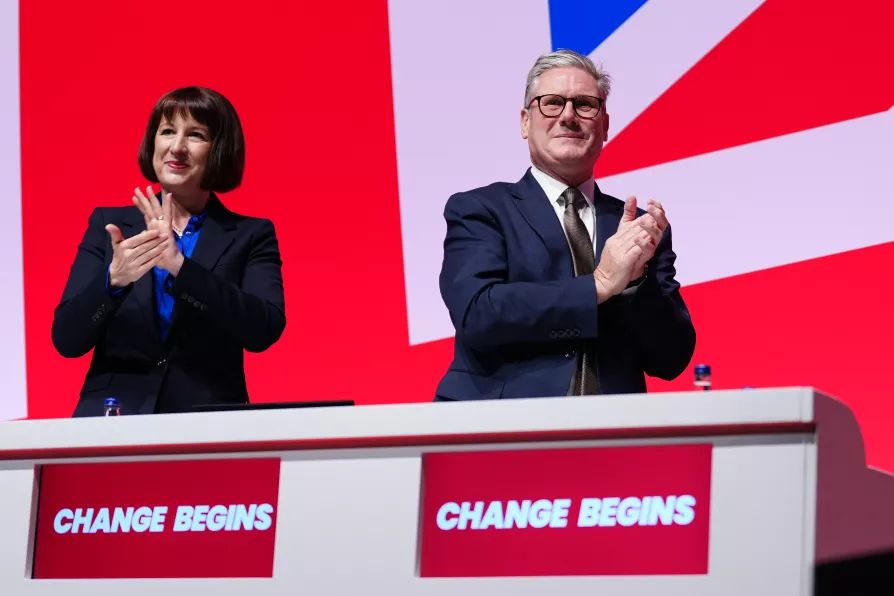
 Prime Minister Keir Starmer and Chancellor of the Exchequer Rachel Reeves clap their hands during the Labour Party Conference in Liverpool, September 22, 2024
Prime Minister Keir Starmer and Chancellor of the Exchequer Rachel Reeves clap their hands during the Labour Party Conference in Liverpool, September 22, 2024
FOR a party back in power after 14 years, the mood at Labour conference is far from triumphant.
Some of that is down to what Fire Brigades Union leader Matt Wrack terms Keir Starmer’s “political ineptitude.” Lower approval ratings than Rishi Sunak within a couple of months is a startling feat.
Targeting pensioners’ winter fuel payments is not just cruel — it reflects the too-clever-by-half wrangling of policy wonks divorced from ordinary people’s concerns, the “tough choices” ministers think make them look serious but which have now backfired to overshadow the entire conference.
The freebies from millionaires row is another self-inflicted wound, misjudgement from a Prime Minister unable to grasp why ordinary people object to politicians being bought and paid for.
But both reflect deeper problems than Starmer’s lack of political nous.
Delegates, as today’s Morning Star fringe meeting heard, make up just 800 of the 20,000 conference attendees. Many wonder whether the party itself is being bought as they wander through the crowds of corporate lobbyists.
Certainly it seems keener to listen to big business than to its members: now Labour is in government, delegation leaders were told, there will be less time available for delegates to speak, to make space for more ministerial grandstanding from the stage.
And the winter fuel cut sends a political message about the entire direction of the government — one that seems committed to “austerity mark II,” as Unite leader Sharon Graham warns.
It is that choice which unions challenge tomorrow after successfully battling to have the winter fuel cut debated on the conference floor.
There is power in the labour movement to shift this government, if we are ready and willing to take the fight to No 10.
Angela Rayner’s focus on the new deal for workers in her opening speech shows that.
While still subject to last-minute negotiations, this package, accompanying the abolition of anti-strike laws passed in 2016 (imposing ballot thresholds) and 2023 (minimum service levels), is a creation of the labour movement: draft legislation originating with the Institute of Employment Rights, made into TUC policy following campaigning led by the CWU, and won and maintained as Labour policy because of sustained pressure from unions.
In other fields, too, it is workers’ organisations that should be shaping the policies we need to rebuild our public services and heal the “societal rot” the Prime Minister condemns. This is especially true of the NHS, where Labour’s promised “reimagining” of our universal health service threatens deeper private-sector involvement.
The problem if our movement does not propose, champion and win a real economic alternative was eloquently put at the People’s Assembly rally outside the conference gates. The far right is a clear and present danger.
Starmer shows a worrying complacency about Labour’s far from impressive election result. A huge majority: but with the lowest vote share of any winning government ever, and an actual decline of half a million votes from the 2019 election, which everyone accepts was a disaster.
The glum mood at Labour conference reflects a wider national feeling that Labour is not offering hope. A Labour government that continues the austerity policies of the loathed and discredited Tories will meet their fate, and fast: as July’s election proved, British politics is volatile and huge majorities can vanish at a stroke.
With Reform UK in second place across scores of Labour constituencies, the consequences of failure will be grim.
Labour must be made to take different choices. Its government is not popular: but this weakness can be used by the left as well as the right, to make MPs and councils understand the need to change course or face oblivion.
Unions winning a vote on winter fuel cuts should just be the start. A labour movement-led campaign for a true alternative could change the political narrative and, in time, the country itself.














